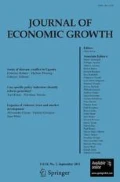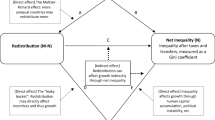Abstract
Despite the predictions of the neoclassical theory of economic growth, we observe that poor countries have invested at lower rates and have not grown faster than rich countries. To explain these empirical regularities we provide a game-theoretic model of conflict between social groups over the distribution of income. Among all possible equilibria, we concentrate on those that are on the constrained Pareto frontier. We study how the level of wealth and the degree of inequality affects growth. We show how lower wealth can lead to lower growth and even to stagnation when the incentives to domestic accumulation are weakened by redistributive considerations.
Similar content being viewed by others
References
Alesina, A., and R. Perotti. (1993). “Income Distribution, Political Instability and Investment.” Working paper 4486, National Bureau of Economic Research.
Alesina, A., and D. Rodrik. (1994). “Distributive Politics and Economic Growth.” Quarterly Journal of Economics 109, 465–490.
Azariadis, C., and A. Drazen. (1990). “Threshold Externalities and Economic Development.” Quarterly Journal of Economics 105, 501–526.
Barro, R. (1991). “Economic Growth in a Cross-Section of Countries.” Quarterly Journal of Economics 106, 407–443.
Baumol, W. J., and E. Wolff. (1988). “Productivity Growth, Convergence and Welfare; Reply.” American Economic Review 78, 1155–1159.
Benhabib, J., and G. Ferri. (1987). “Bargaining and the Evolution of Cooperation in a Dynamic Game.” Economics Letters 24, 107–111.
Benhabib, J., and R. Radner. (1992). “The Joint Exploitation of a Productive Asset: A Game Theoretical Approach.” Economic Theory 2, 155–190.
Benhabib, J., and A. Rustichini. (1991). “Social Conflict, Growth and Income Distribution.” CMS Discussion Paper 937, Northwestern University.
Chari, V. V., and P. J. Kehoe. (1990). “Sustainable Plans.” Journal of Political Economy 98, 783–802.
DeLong, J. B. (1988). “Productivity, Growth, Convergence and Welfare: A Comment” American Economic Review 78, 1138–1154.
Easterly, W. (1991). “Economic Stagnation, Fixed Factors, and Policy Thresholds.” Discussion Paper, World Bank.
Fisher, S. (1991). “Growth, Macroeconomics and Development.” Working Paper 3702, National Bureau of Economic Research.
Galor, O. and J. Zeira (1993). “Income Distribution and Macroeconomics” Review of Economic Studies 60, 35–52.
Grossman, H. I. (1991). “A General Theory of Insurrections.” American Economic Review 81, 912–921.
Lancaster, K. (1973). “The Dynamic Inefficiency of Capitalism.” Journal of Political Economy 81, 1098–1109.
Levhari, D., and L. J. Mirman. (1980). “The Great Fish-War: An Example Using the Cournot-Nash Solution.” Bell Journal of Economics 11, 322–334.
Levine, R., and D. Renelt. (1992). “Cross-Country Studies of Growth and Policy.” American Economic Review 82, 942–963.
Londregan, J., and K. Poole. (1990). “Poverty, the Coup Trap, and the Seizure of Executive Power.” World Politics 42 (January), 151–183.
Lucas, R. E.Jr. (1988). “On the Mechanics of Economic Development.” Journal of Monetary Economics 22, 3–42.
Majumdar, M., and R. K. Sundaram. (1991). “Symmetric Stochastic Games of Resource Extraction: The Existence of Non-Randomized Stationary Equilibrium.” In T. E. S. Raghavan et al. (eds.), Stochastic Games and Related Topics. Netherlands: Kluwer.
Mallon, R. D., and J. V. Sourrille. (1975). Economic Policy-Making in a Conflict Society: The Argentine Case. Cambridge, MA: Harvard University Press.
Mankiw, G., D. Romer, and D. Weil. (1992). “A Contribution to the Empirics of Economic Growth.” Quarterly Journal of Economics 106, 407–437.
Marcet, A., and R. Marimon. (1990). “Communication, Commitment and Growth.” Journal of Economic Theory 58, 219–249.
O'Donnell, G. (1988). “State and Alliances in Argentina, 1956–1976.” In R. H. Bates (ed.), Towards a Political Economy of Development. Los Angeles: UCLA Press.
Olson, M. (1982). The Rise and Decline of Nations. New Haven, CT: Yale University Press.
Persson, T., and G. Tabellini. (1994). “Is Inequality Harmful for Growth?” American Economic Review 84, 600–621.
Romer, P. (1986). “Increasing Returns and Long Run Growth.” Journal of Political Economy 94 (October), 1102–1037.
Romer, P. (1990). “Trade, Politics, and Growth in a Small, Less Developed Economy.” Working Paper, University of California, Berkeley.
Rustichini, A. (1992). “Second Best Equilibria in Games of Joint Exploitation of a Reproducible Asset.” Economic Theory 2, 190–201.
Tornell, A. (1992). “Economic Growth and Decline with Endogenous Property Rights.” Working paper 4354, National Bureau of Economic Research.
Tornell, A., and A. Velasco. (1992). “Why Does Capital Flow from Poor to Rich Countries? Interest Groups and Dynamic Games in Poor Countries.” Journal of Political Economy 100, 1208–1231.
Venieris, Y. P., and D. K. Gupta. (1986). “Income Distribution and Sociopolitical Instability of Determinants of Savings: A Cross-Sectional Model.” Journal of Political Economy 94, 873–884.
Author information
Authors and Affiliations
Rights and permissions
About this article
Cite this article
Benhabib, J., Rustichini, A. Social conflict and growth. J Econ Growth 1, 125–142 (1996). https://doi.org/10.1007/BF00163345
Issue Date:
DOI: https://doi.org/10.1007/BF00163345




